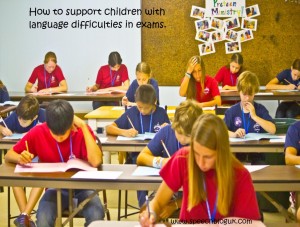Exams are a reality for every child going through education. Things have changed a lot in recent years and a lot is done through teacher assessment and coursework, but sooner or later, everyone has to pass an exam. This is a stressful situation for any student, but a child with a language difficulty has even more difficulties to overcome in order to show what they know in an exam. How can we support them with this? Here are a few ideas:-
- First of all, find out what (if any) specific access arrangements a child is entitled to, by talking to the SENCO (Special Educational Needs C0-Ordinator). Most people know that if you have additional needs you can sometimes get extra time for exams, and this can be helpful for some children. However, this is not the only possibility. Some children are entitled to a reader and/or a scribe, and some are able to have an “oral language modifier”. This means that, within certain guidelines, someone can rephrase the questions to aid comprehension. There are other possibilities too and of course there are guidelines about who is entitled to what support. You can find out more about this here.
- If this is the first proper “exam” that the child has done, don’t assume that they know what will happen. Talk through with them exactly what will happen step by step so that they are not anxious about the process of the exam on the day.
- Work on exam vocabulary with the student. There are a lot of potentially confusing words in exam questions and unless you understand them you are unlikely to be able to give the right sort of answer. Does the student know what “discuss” means for example, or “estimate” or “evaluate”? Work through them all one at a time with clear examples. This is a big one for children with language difficulties and can make a huge difference to whether they are able to show what they know in the exam or not.
- Exam questions are often quite confusing in the way that they are worded. Take Maths for example. Often a child may be able to answer the question if it’s written “12×3” but have much more difficulty if it says “Abigail, Jamie and Billy each have 12 sweets. How many do they have altogether?” This is harder because the child has to work out what they have to do. Practise breaking questions down. A useful way to do this is to go through them with a highlighter and see if the child can highlight the important words. Then look at the important words together and see if they can work out what they have to do.
- Many children, both with and without language difficulties, don’t know how to revise. Teach them how to do this. First of all, talk to the child about what helps them to remember things and help them to identify how they can use this. If they understand why they are using the strategies, they are more likely to use them independently. Encourage them to use visual strategies as much as possible to help them. Mind maps are great for identifying and organising the important information about a topic (this is a helpful book about mind mapping). Encourage the child to use colour, mnemonics, visualisation, whatever memory strategies help them. You can find out more about memory strategies here. There is also a helpful article about teaching study skills here.
- Similarly, help the student to structure revision time. Help them to break down subjects into topics and structure time so that they have spent time revising as many topics as they need to. Again, this is a skill which does not come naturally to many, particularly children with dyspraxia, to name one example.
- Finally, exams are stressful for everyone, but they can be even more stressful if you struggle with change or think in a very literal way. This is easier said than done, but try to help the student to have a sense of perspective about the exam. Many students with language difficulties can think about things in a very black and white way and so anything less than perfection can seem like a tragedy. Relaxation exercises may help some. There is also a useful handout on the National Autistic Society website here about helping children with change and sensory difficulties that could be associated with exams.
What else have you found helps students with language difficulties to prepare for exams?







Thank you very much for this article and all the attachments. It is very helpful, as my son is about to embark on his GCSEs and he has specific language impairment. So we will use all the help we can get. Thanks again.
You’re welcome. Glad you found it useful.